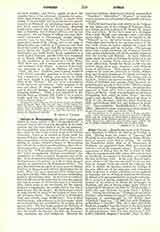

Othlo (OTLOH), a Benedictine monk of St. Emmeran’s, Ratisbon, b. 1013 in the Diocese of. Freising; d. 1072. Having made his studies at Tegernsee and Hersfeld, he was called to Würzburg by Bishop Meginhard on account of his skill in writing. He entered the Benedictine Order, 1032, at St. Emmeran’s in Ratisbon, was appointed dean, 1055, and entrusted with the care of the monastic school. To escape the oppressions of Bishop Otto he fled to Fulda in 1062 where he remained until 1067, when, after a short stay at Amorbach, he returned to Ratisbon and employed his time in literary work. In his early days he had a great relish for the Classics, especially for Lucan, but later he thought them not suited for religious, and tried to replace the heathen authors by writings of his own which served for education and edification. Othlo is praised as modest and pious; he was opposed to dialectics, not out of lack of education but because he wished to be untrammelled by set words and forms. He is accused of having originated the legend of the transfer of the relics of St. Denis the Areopagite to Ratisbon, and also of having forged many letters of exemption for his abbey (Lechner in “Neues Archiv”, XXV, 627, and “Zeitschr. für kath. Theol.”, XXXI, 18). Among his writings are: “Dialogus de suis tentationibus, varia fortuna et scriptis”, which marked the beginning of autobiography in the Middle Ages (Mabillon, “Anal. nov.”, IV, 107); Life of St. Wolfgang of Ratisbon (“Acta SS.”, November, II, 1, 565); He of St. Boniface, compiled from the letters of the saint found at Fulda; Life of St. Alto (partly in “Acta SS.”, February, II, 359 and entire in “Mon. Ger. hist.: Scriptores”, XV, 2, 843); Life of St. Magnus (“Acta SS.”, September, II, 701).
In Pez (“Thesaurus”, III, 143-613) are found: “Dialogus de tribus qaestionibus”, treating of the symbolism of the number three; “De promissionis bonorum et malorum causis”; “De cursu spirituali”; “De translatione s. Dionysii e Francia in Germaniam”, a fragment; “De miraculo quod nuper accidit cuidam laico”; “De admonitione clericorum et laicorum”; “De spirituali doctrina”, in hexameters; “Liber Proverbiorum”; “Sermo in natali apostolorum”; “Liber visionum tum suaruin turn aliorum”. His collected works are found in Migne (P.L., CXLVI, 27-434).
FRANCIS MERSHMAN

